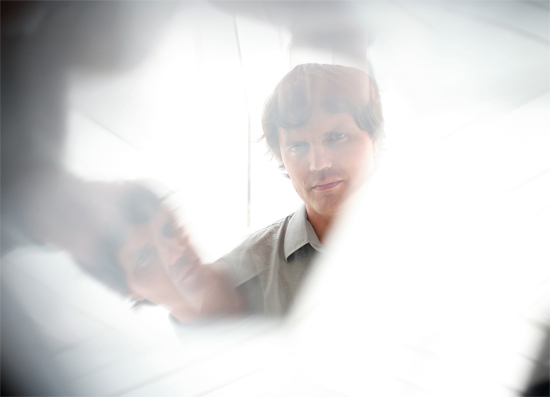The product of a collaboration between trumpeter Dr Andrew Blick (think Malcolm McDowell if he’d grown up stuck into the part of one of the unpleasant characters he played onscreen), his septuagenarian dad and various London-based musicians, Gyratory System’s debut album The Sound Board Breathes is one of the most unusual records released in 2009, and another corker from the ever-reliable Angular stable. Anyone disgusted by the way that brass has become a mere addendum to major label producers looking for a big chorus bolt-on would do well to check out The Soundboard Breathes, reminiscent as it is of Miles Davis circa On The Corner, Andy Diagram or Jon Hassell, and influenced by Spectralist composition. And, as it happens, we’ve joined forces with new music streaming service Fairtilizer and Angular Records to offer you an exclusive stream of The Sound Board Breathes and a free download of one of its unusual constituent parts. We also asked Dr Blick to take time out of his busy schedule writing learned tomes for politicians to talk a little about Gyratory System’s mysterious modus operandi, which they call ‘The Process’.
So, can you explain a little about The Process?
The process is a means by which we collide pre-ordained musical ideas with random elements. The exact way in which it works is constantly evolving, since the process is itself a process. For this album, we used a basic formula to construct a backing track, then improvised live instruments on top of it, then re-introduced the original formula to finish the track.
You’ve talked about the museum featuring lots of automaton music machines. If money were no object, would you like to include such devices in the Gyratory System sound?
Steam powered sequencers would be interesting. Britain still leads the world in steam-power. A few months ago a British-built steam powered car broke the land-speed record for a steam powered vehicle. The old record had stood since 1906. It was about 136 miles per hour, now it is 140. If that can be done, steam powered sequencers can happen too.
What effect does the pan-generational set up of GS have on the music, especially the live show?
Taking apparently diffuse things and combining them into a coherent whole is a big part of what we do.
Having an older person in the band means we can take that principle and represent it in terms of the actual line-up and the way we appear visually to the audience – it gets them ready for the kind of thing they are going to hear, even if they don’t know it. Also, all generations have different influences and ideas and this means we can draw on more of them, so the music is often the product of things not all of us know about.
Have you been surprised with the positive reaction?
Pleased but not completely surprised because we liked what we had done, or hopefully we wouldn’t have released it, and we had had some good feedback already. We don’t regard the music as inaccessible.
What would you say to anyone struggling to understand GS?
I would say you don’t need to try to understand it, it is about rhythms and textures washing over you, repeating and modulating along the way.
Do you think brass and woodwind has had a raw deal in reccent years? I’m thinking of the Kick Horns Britpop ubiquity, or Mark Ronson’s parping. Why do you think this is?
There was some interesting stuff done with brass in the 1960s on pop music – like the Rolling Stones ‘Have you seen your mother, baby?’ But some of what went on then got frozen in time and all some producers want to do is caricature the 60s sound of ‘Penny Lane’ or whatever.
If you look at musical history the trumpet has been at the forefront of sonic revolution. Are GS reclaiming that status for the instrument?
When you play the trumpet you are taking on a large historical legacy, not all of it nice. In particular it was a war instrument, which is partly why it ended up being used in jazz, because trumpets or cornets were left lying around after the end of the American Civil War and eventually fell into the hands of the early jazz musicians. The trumpet has always developed – it didn’t have valves until the nineteenth century, mutes started being used heavily in the twentieth century. We are trying to do new things with the trumpet and other acoustic instruments – oboes, clarinets, saxophones, euphoniums – by applying electronic effects to them. So hopefully that can help put it back at the forefront of music where it was in the time of JS Bach and jazz musicians like King Oliver and Miles Davis.
Please name three non-musical instruments?
We would like to play Birmingham using Wolverhampton as a reverb unit and Coventry as a distortion pedal.
Thanks. We meant to write ‘influences’, but your album had deranged us. How do you see the process and Gyratory System evolving?
It is constantly expanding as the Process develops. We have a remixed version of one of our tracks, ‘Yowser, Yowser, Yowser’ coming out on February 15th next year, which should give people an idea of where it is going – it has got bigger and more complex. A Phil Spector comeback looks less likely than ever, so it is up to others to create a vast sound.



